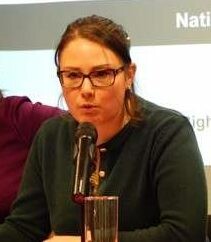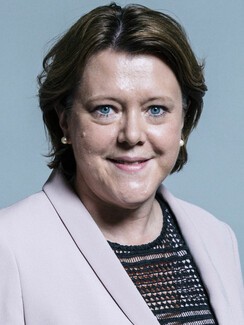‘Robbing my sons of hope’ - East Sussex set to cut Traveller education team

Traveller mother of three Kerry Mains vows to fight the Council’s proposals to cut dedicated GRT education team – “my sons will not be robbed of hope”
Traveller parents and a leading Gypsy, Roma and Traveller charity have highlighted the “desperate need” for a dedicated Traveller education team after local council proposals threaten its future existence.
In a consultation launched last month, East Sussex County Council are proposing to no longer have any Gypsy, Roma and Traveller (GRT) Education Team teachers working directly with parents and pupils from those communities, and will instead provide “advice and guidance” to schools. East Sussex has 378 GRT children that they know of in their schools.
Kerry Maines, an East Sussex Irish Traveller parent, told the Traveller’s Times that she only found out about the proposals – and the consultation – after she tried to contact the GRT Education team to get support for her son Jimmy, who is nine and autistic. Kerry says that her son’s school has asked her to complete the forms for his Education, Care and Health Plan and she turned to East Sussex Traveller education team – who had supported her daughter in the past - but they couldn’t help.

“I strongly feel that the rights of our children are being breached by withdrawing the GRT Support,” said Kerry Maines.
In an email reply to Kerry Maines from an East Sussex County Council, seen by the Travellers’ Times, an education manager tells Kerry that the “advice and guidance” for schools with GRT pupils, will be delivered “via online resources and central training.”
The manager also writes that there already exists council support for pupils “behaviour and attendance” and for those with “low literacy” and also a dedicated special education needs team.
Traveller education experts believe that experienced and dedicated GRT Education workers liaising between the community and schools, are vital in supporting GRT pupils and parents so that attendance, behaviour and low literacy doesn’t become a problem in the first place. They are also useful for encouraging families to ‘tick the GRT box’ for their pupils so that they then get the extra support that they often need.

Lisa Smith, Romany Gypsy Chair of the Advisory Council for the Education of Romany and other Travellers, said that families use Traveller education services as a supportive tool to help advocate for their children’s’ rights to and within education.
“The lack of dedicated support for families coupled with a very fragmented educational system is no doubt having an impact on the number of young people accessing and remaining in education until compulsory school leaving age,” said Lisa Smith. “The ‘one size fits all’ approach adopted by government and councils is an issue because it doesn’t recognise that not all young people start life on an even level playing field - and that many young Travellers experiences of school are characterised by discrimination.”
Kerry Maines agrees. “This service makes it possible for the most vulnerable members of our community to be supported in embracing education at all levels.” She said.
“The only formal education some of the men in my family have received has been in a prison. My sons will not be robbed of hope like they were. I will not allow it.”
Kerry Maines added that schools were often reluctant to enrol pupils who could be classed as having special education needs because they don’t have the extra funds needed available. She also pointed out that:
* GRT CHILDREN HAVE THE WORST EDUCATION OUTCOMES OF ANY ETHNIC GROUP IN THE UK.
* GRT CHILDREN ARE THE LOWEST ACHIEVING GROUP AT EVERY KEY STAGE
* GRT CHILDREN ARE THREE TIMES MORE LIKELY TO BE EXCLUDED
* GRT CHILDREN HAVE THE HIGHEST ABSENCE RATES
GRT Education teams have been being slashed in most Councils since 2010. In 2011 an investigation by the Independent newspaper found that nearly half of 127 authorities had either abolished their Traveller education service or drastically cut staff levels.
The Travellers’ Times has seen the Independent’s 2011 research and it appears that East Sussex County Council was bucking the trend to slash Traveller education and that the number of staff they employed and the hours they worked in roles “directed towards improved access, attendance and achievement of Traveller children” had risen slightly from 2006.
However, the Traveller’s Times does not know if any cuts have been made by the Council since 2011, and when we asked them how big their Traveller education team was now, a Council spokesperson replied that it was “inappropriate” to answer.
Earlier this year, Parliament’s Women’s and Equalities Committee published a long awaited report on inequalities and discrimination facing Gypsy, Roma and Traveller families and concluded that the education system was failing them.

Maria Miller, MP for Basingstoke and head of the Women and Equalities Committee, said that this failure had gone on for too long.
“Access to education, health, employment, criminal justice, tackling hate crime and domestic violence - all these require services which differentiate between different groups who have different needs, and yet so many services are ill-equipped to support Gypsy, Roma and Traveller people,” she added.
“The Government must stop filing this under 'too difficult' and set out how it intends to improve health, education and other outcomes for these very marginalised communities who area all too often "out of sight and out of mind."
While the number of Gypsy Roma and Traveller people in the UK may be small compared to other groups, the Government’s commitment to race equality must reach even the most disenfranchised".
The Traveller’s Times approached East Sussex County Council for comment and to ask them who would be supporting GRT families if the specialist Traveller teacher team was cut. A Council spokesperson replied that their Teaching and Learning Provision (TLP) service provided support to schools to enable them to meet the needs of their GRT pupils, and also provides a statutory service for children who are too sick to attend school and those who are electively home educated.
“In recent years we’ve seen a significant rise in the number of pupils being electively home educated, placing increasing strain on the TLP service,” said the East Sussex County Council spokesperson.
“To ensure we can continue to meet our statutory duties – those we’re obliged by law to provide – and to make best use of our limited resources, we need to review what we offer through this service and how we deliver that support.
“We’re currently consulting on offering support for GRT pupils in the form of advice and guidance to schools, rather than directly through a small number of dedicated GRT teachers as at present.
“It has always been the responsibility of schools to support children from all backgrounds to make progress and achieve their potential.
“However, we will continue to support children with special educational needs and disabilities – including GRT pupils – thorough our Inclusion, Special Educational Needs and Disabilities teams, which have developed skills in working with children from GRT communities.
“It’s important to stress that no decision has been made yet and we’d encourage people to take part in the consultation by the deadline of October 7 to ensure their voice is heard.”
Sarah Mann, Director of Friends, Families and Travellers, a leading national Gypsy, Roma and Traveller charity, called the Council’s proposals “shameful.”
“There is a large body of evidence on inequalities experienced by Gypsy, Roma and Traveller communities in education and for a desperate need for government policy to address this,” said Sarah Mann.
“In light of this it is shameful for ESCC to be cutting back and removing support for Gypsy, Roma and Traveller pupils.”
The East Sussex County Council consultation on can be found at https://consultation.eastsussex.gov.uk/childrens-services/tlp-service-consultation/
By Mike Doherty/TT News
(Main photograph: East Sussex County Council County Hall in Lewes. By Kevin Gordon)